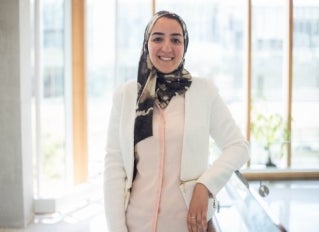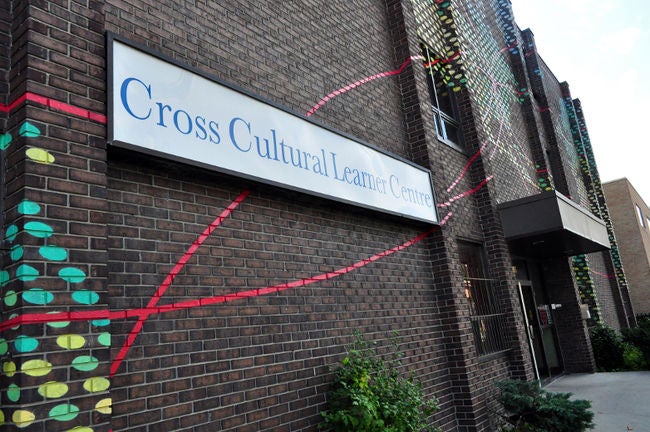By fourth year pharmacy student Danyah Musbah

As of November 2015, Canada has welcomed a total of 28,755 Syrian newcomers to communities across the nation. Many others await finalization of their application process. As reported by Citizenship and Immigration Canada, approximately 50% of this population are younger than 24 years old. Almost all speak Arabic, and have minimal to some understanding of English.
Throughout my education, I recognized the gravity of the pharmacist’s impact as one of the most accessible healthcare professionals in the community. Besides our role of medication counseling and treatment monitoring, our promotion of patient self-care and disease management goes a long way in preventing complications of medical conditions down the road.
As an eager pharmacy student and an Arabic speaker, I wanted to assist Syrian refugees with the transition into their new home. I was looking for a way to apply my professional knowledge in assisting this population because I knew one of their biggest barriers to healthcare access is language. Although the majority are trying to learn English, medical language can be tricky, and often, newcomers can struggle with conversations surrounding healthcare topics.
My prayers were answered in February during my fourth year clinical rotations in London, where my fantastic preceptor Munir Suleiman put me in contact with the London InterCommunity Health Center (LIHC). LIHC’s mandate is to provide services for patients that face barriers to accessing care, such as poverty, mental health, and language. They partnered up with the Cross Cultural Learning Center (CCLC), an organization that helps with resettlement of newcomers/refugees. This partnership led to the organization of daily “walk-in” clinics where patients from this population would be seen for acute ailments, such as respiratory infections, or for chronic conditions, like diabetes.
A Pharmacist’s Role in a Refugee Clinic

The clinic team, run out of CCLC (left), worked diligently in providing care to these new Canadians. There was a need for Arabic-speaking healthcare professionals to provide health information, and that is where my role and abilities came to play. I was integrated into an interprofessional environment, working alongside nurses, interpreters, intake clerks, and Nurse Practitioners (NPs).
My role was to assist NPs with interpretation during physical assessments, and provide medication counseling if the NP deemed it appropriate to prescribe a medication. Collaborating with the NP and other professionals, I was able to identify and solve drug therapy problems, educate patients on basic management of chronic medical conditions, and act as a drug information resource for the team.
Counseling patients from other countries inevitably results in unique challenges. Some patients returned to the clinic because they misunderstood how to take their antibiotics. Others were taking medications foreign to our practice here in Canada, so it was an exciting challenge to find equivalent medications, and navigate therapy going forward.
Healthcare Providers: Tips for overcoming language barriers
In November of 2015, the International Pharmaceutical Federation published guidelines for community pharmacists and professionals on how to provide services to the incoming refugee population in Europe. Some of the useful tools mentioned in the guidelines include:
- Use of Pictogram Software to explain how to take medications
- Encouraging the use of translational applications on smartphones (ex Google Translate)
- Printing medication instructions in the patient’s language, if possible
Other Canadian resources that may also be helpful:
- Lexicomp ® Patient Education Packages on medications and health conditions, available in many different languages
- Information about the Interim Federal Health Program - the temporary health insurance coverage provided to refugees
- Other resources provided by Canadian Pharmacists Association
Working one-on-one with refugees
The patients I met with at the clinic were truly appreciative of the efforts involved in providing safe and effective treatment to themselves and their families. They were also touched by the welcoming and positive demeanour that the healthcare professionals exhibited, despite the language barrier.
I was very honoured to work synergistically alongside an incredible team of health professionals, and I was inspired by their dedication to make a difference in the community. In addition to my personal inspirations, I was very motivated by the support of my preceptor Munir Suleiman to apply my skills in assisting this population.
It was also an honor for me to represent my class (Rx2016) and my school, as the education and support from my professors and peers has greatly contributed to my ongoing goal of providing exceptional patient-centered care.
From this experience, I learned unforgettable lessons of teamwork, resourcefulness and accountability. I am extremely grateful to have been a part of this endeavour, and I hope to continually seek more opportunities where I can give back to the community.